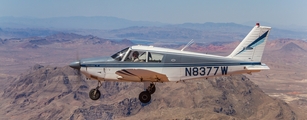
|
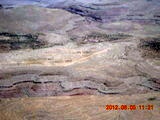
|
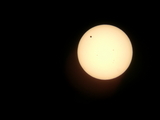
| |
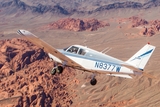
| |||
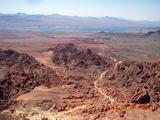
|
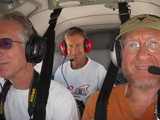
|
A PILOT VACATION - TRANSIT OF VENUS
2012 June 5-7

|

|

| |

| |||

|

|
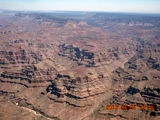 It's the kind of vacation I can't imagine doing
without an airplane to fly.
The transit of Venus was
2012 June 5, Tuesday afternoon,
a few days ago.
While the transit itself was visible from lots of places,
three of my solar-eclipse-trip buddies were in Saint George, Utah,
which isn't visible from quite as many places.
Google maps says
the drive from Phoenix to Saint George is seven hours
(okay, six hours and fifty-four minutes).
While the part of that drive from Mesquite to Saint George
is exquisitely beautiful,
most of the drive is flat desert without much to see.
It's the kind of vacation I can't imagine doing
without an airplane to fly.
The transit of Venus was
2012 June 5, Tuesday afternoon,
a few days ago.
While the transit itself was visible from lots of places,
three of my solar-eclipse-trip buddies were in Saint George, Utah,
which isn't visible from quite as many places.
Google maps says
the drive from Phoenix to Saint George is seven hours
(okay, six hours and fifty-four minutes).
While the part of that drive from Mesquite to Saint George
is exquisitely beautiful,
most of the drive is flat desert without much to see.
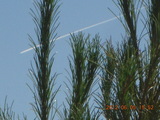 Knowing Bill, Howard, and Ron were going to be in Saint George
for the transit of Venus on 2012 June 5,
I made plans to see my buddy Mike who lives in Las Vegas.
The flight planning wasn't terrible,
Phoenix Deer Valley Airport to Saint George Airport (DVT-to-SGU)
is two hours from takeoff to landing,
SGU to North Las Vegas Airport (VGT) is an hour,
and VGT back to DVT is another two-hour flight.
I wanted to check out a new-to-me back-country airstrip
called Grand Gulch
(36 19.24', -113 47.17' on
SkyVector
and on
Google Maps
complete with a fly-by
Vimeo video).
Also, Mike was
nice
enough to let me fly his high-performance Cirrus 22 airplane
last time I saw him,
so I felt I could offer him a flight to the kind of place
he wouldn't take a Cirrus.
So we planned a flight to Pearce Ferry
(landing Vimeo video),
a nice dirt airstrip on Lake Mead
not far from Las Vegas.
Knowing Bill, Howard, and Ron were going to be in Saint George
for the transit of Venus on 2012 June 5,
I made plans to see my buddy Mike who lives in Las Vegas.
The flight planning wasn't terrible,
Phoenix Deer Valley Airport to Saint George Airport (DVT-to-SGU)
is two hours from takeoff to landing,
SGU to North Las Vegas Airport (VGT) is an hour,
and VGT back to DVT is another two-hour flight.
I wanted to check out a new-to-me back-country airstrip
called Grand Gulch
(36 19.24', -113 47.17' on
SkyVector
and on
Google Maps
complete with a fly-by
Vimeo video).
Also, Mike was
nice
enough to let me fly his high-performance Cirrus 22 airplane
last time I saw him,
so I felt I could offer him a flight to the kind of place
he wouldn't take a Cirrus.
So we planned a flight to Pearce Ferry
(landing Vimeo video),
a nice dirt airstrip on Lake Mead
not far from Las Vegas.
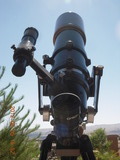 One wrinkle that came up was a forecast of high winds
for 2012 June 5 in Saint George,
high enough winds to make telescopes wobble around.
Bill, Howard, and Ron had a "Plan B"
which was to drive to Valley of Fire State Park in Nevada
in a car big enough for only three people and telescopes.
Well, it turns out Perkins Airport (U08) was near there,
so I could see my buddies in any case.
One wrinkle that came up was a forecast of high winds
for 2012 June 5 in Saint George,
high enough winds to make telescopes wobble around.
Bill, Howard, and Ron had a "Plan B"
which was to drive to Valley of Fire State Park in Nevada
in a car big enough for only three people and telescopes.
Well, it turns out Perkins Airport (U08) was near there,
so I could see my buddies in any case.
So what's the best thing after a very busy flying month? Another aviation vacation, of course!
The next morning I took the guys up for an airplane ride
around Zion National Park before I headed for Las Vegas.
It's funny, I belong to a lot of pilot groups.
I'm an active member of the Phoenix Pilots Group
on MeetUp,
the "just `plane' folks" of
The Breakfast Club,
the Arizona Pilots Association,
EAA Chapter 1217,
the Utah Back-Country Pilots,
the New Mexico Pilots,
a couple of Facebook pages,
and the pilot group
at my home field of Deer Valley (DVT).
I guess when it came time to sign up as a recluse in aviation,
I must have been too busy socializing with other pilots.
This trip was everything I love about having an airplane.
I know people with campers or boats.
They're a lot of fun
but getting anywhere interesting takes a long time
and often isn't interesting in its own right.
Flying from here to there is a lot of fun for me
and I have fun flying around wherever I end up going.
It's exactly the kind of trip I feel an airplane was made for.
It's seven hours of driving from Phoenix to Saint George
and most of that isn't very interesting.
(The last hour, from Mesquite through the Virgin River valley,
is spectacularly beautiful,
and more so from the ground than from the air, actually.)
Still, I know I wouldn't have bothered with the trip
without the extra aviation connection
to make it special.
Las Vegas and Saint George are a few hours apart by car,
again with a couple of flat, boring hours in there,
and a pleasant hour of grand scenery in the airplane.
I've done one airplane camping trip at a back-country airstrip
(Negrito (0NM7) in New Mexico)
and am seriously considering getting a tent and sleeping bag
to keep in the baggage compartment of my airplane.
Eastern Airlines used to advertise
that getting there was half the fun.
If going someplace by airline is half the fun,
at least these days,
then you must be going someplace awful.
Going places by Piper Cherokee is terrific for me
and this is exactly the kind of spontaneous, flexible vacation
I think it was made for.
It's also the kind of vacation I think I was made for, too.
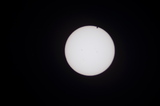
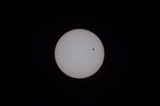
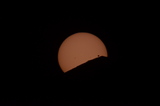
Transit of Venus - Tuesday
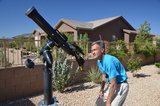 The planet Venus has an orbit around our sun
that is enough askew from Earth's orbit
that it comes between Earth and sun
about four times every 243 years.
While a solar or lunar eclipse is a big thing to watch in the sky,
the image of Venus against the sun is 1/30 the size of the sun.
With 99.9% of the sun unobstructed,
the transit is something one has to look for in the sky.
With the sun being too bright to watch safely,
it's something one has to look for wearing special safety glasses.
So, unless you're walking down the street wearing
special solar-viewing glasses and taking careful note of the sun,
a transit of Venus would be easy to miss.
The planet Venus has an orbit around our sun
that is enough askew from Earth's orbit
that it comes between Earth and sun
about four times every 243 years.
While a solar or lunar eclipse is a big thing to watch in the sky,
the image of Venus against the sun is 1/30 the size of the sun.
With 99.9% of the sun unobstructed,
the transit is something one has to look for in the sky.
With the sun being too bright to watch safely,
it's something one has to look for wearing special safety glasses.
So, unless you're walking down the street wearing
special solar-viewing glasses and taking careful note of the sun,
a transit of Venus would be easy to miss.
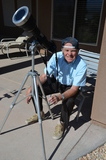 With half a dozen telescopes with various filters and cameras,
with precise, scientific forecasts to the minute,
Bill, Howard, and Ron weren't going to miss the event.
Weather was gloriously clear just about everywhere
in the four-corners states,
wind was annoying but not catastrophic for telescope viewing,
and the decision was made to stay in Saint George
(rather than to try to find stiller air somewhere else).
I got the news 2012 June 5, Tuesday morning,
and was in Saint George four hours later
(including taking my morning shower and getting dressed).
With half a dozen telescopes with various filters and cameras,
with precise, scientific forecasts to the minute,
Bill, Howard, and Ron weren't going to miss the event.
Weather was gloriously clear just about everywhere
in the four-corners states,
wind was annoying but not catastrophic for telescope viewing,
and the decision was made to stay in Saint George
(rather than to try to find stiller air somewhere else).
I got the news 2012 June 5, Tuesday morning,
and was in Saint George four hours later
(including taking my morning shower and getting dressed).
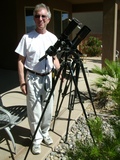 The transit itself was an event
amplified by the enthusiasm of three astronomer-geeks.
You know how young whiz-kids are always playing one-upmanship games?
If one points out that a square 40% larger has twice the area,
then somebody has to point out that the square root of two
is actually not 1.40 but 1.41421356.
We were an old-enough crowd that
we all knew the logarithms of small integers from actual use
and we all knew the unimportance of remembering all the digits.
(For example, when it was pointed out that Venus at one-minute of arc
was 1/30 of the sun's half degree,
the area it covered was agreed to be 0.1% of the sun
without somebody harping that it was really 1/900 instead of 1/1000.
We had a typical science-nerd discussion of the length of
the dark ("umbral") shadow of Venus,
figuring it out "from facts already in evidence"
like Venus being earth-sized,
the moon's shadow being 240 thousand miles,
earth being four times bigger than the moon,
and Venus being two-thirds as far from the sun.)
The transit itself was an event
amplified by the enthusiasm of three astronomer-geeks.
You know how young whiz-kids are always playing one-upmanship games?
If one points out that a square 40% larger has twice the area,
then somebody has to point out that the square root of two
is actually not 1.40 but 1.41421356.
We were an old-enough crowd that
we all knew the logarithms of small integers from actual use
and we all knew the unimportance of remembering all the digits.
(For example, when it was pointed out that Venus at one-minute of arc
was 1/30 of the sun's half degree,
the area it covered was agreed to be 0.1% of the sun
without somebody harping that it was really 1/900 instead of 1/1000.
We had a typical science-nerd discussion of the length of
the dark ("umbral") shadow of Venus,
figuring it out "from facts already in evidence"
like Venus being earth-sized,
the moon's shadow being 240 thousand miles,
earth being four times bigger than the moon,
and Venus being two-thirds as far from the sun.)
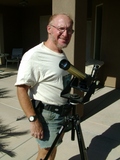 The first and last twenty minutes are interesting
because of the interaction of direct sunlight
and the atmosphere of Venus,
but the middle six hours is about the excitement
of watching paint dry,
so there was plenty of time for these sorts
of pointlessly-technical discussions.
The first and last twenty minutes are interesting
because of the interaction of direct sunlight
and the atmosphere of Venus,
but the middle six hours is about the excitement
of watching paint dry,
so there was plenty of time for these sorts
of pointlessly-technical discussions.
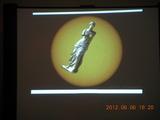
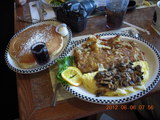
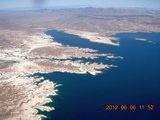
Las Vegas - Wednesday
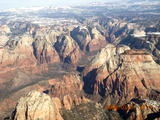 My flight from Saint George to Las Vegas,
with
fly-by passes in both directions at
Grand Gulch
(fly-by Vimeo video)
and a stop to check out Pearce Ferry airstrip,
was pleasant enough
and my friend Mike was able to meet me
at North Las Vegas (VGT).
After settling in and going through all the pictures
we all took at the transit of Venus,
I got a little real work done on the computer at his place
and prepared my talk for Mike's pilot group,
the Las Vegas chapter of the
IMC Club.
They call themselves the Musketeers
(not to be confused with the mid-twentieth-century
Mouseketeers).
My flight from Saint George to Las Vegas,
with
fly-by passes in both directions at
Grand Gulch
(fly-by Vimeo video)
and a stop to check out Pearce Ferry airstrip,
was pleasant enough
and my friend Mike was able to meet me
at North Las Vegas (VGT).
After settling in and going through all the pictures
we all took at the transit of Venus,
I got a little real work done on the computer at his place
and prepared my talk for Mike's pilot group,
the Las Vegas chapter of the
IMC Club.
They call themselves the Musketeers
(not to be confused with the mid-twentieth-century
Mouseketeers).
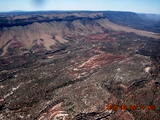 I gave a talk on some of my flying experiences,
especially the back-country stuff,
and my
quest
for landing at more places.
Mike gave a talk on lean-of-peak (LoP) engine operations,
using less fuel and more air for greater economy.
(You
know
the punchline, "Air is free!")
It turns out, he explained, it has nothing to do with fancy instruments
but having the right kind of air intake on the engine.
I gave a talk on some of my flying experiences,
especially the back-country stuff,
and my
quest
for landing at more places.
Mike gave a talk on lean-of-peak (LoP) engine operations,
using less fuel and more air for greater economy.
(You
know
the punchline, "Air is free!")
It turns out, he explained, it has nothing to do with fancy instruments
but having the right kind of air intake on the engine.
 It was fun being with a group of pilots
spanning age, sex, and background
who fly for a lot of different reasons.
It was fun being with a group of pilots
spanning age, sex, and background
who fly for a lot of different reasons.
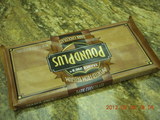 I do love being part of "the scene."
When I brought my eclipse buddy Bill (see above)
to Sedona Airport (SEZ), two people recognized me there.
I've been recognized as far from home as Moab, Utah,
from stuff on this web site.
"Wait a minute, I know you, you're `The Adam,' aren't you?"
Somehow I've managed to meet almost all good, fun, enjoyable people
in aviation.
I do love being part of "the scene."
When I brought my eclipse buddy Bill (see above)
to Sedona Airport (SEZ), two people recognized me there.
I've been recognized as far from home as Moab, Utah,
from stuff on this web site.
"Wait a minute, I know you, you're `The Adam,' aren't you?"
Somehow I've managed to meet almost all good, fun, enjoyable people
in aviation.
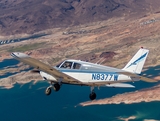

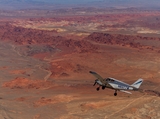
Lake Mead - Thursday
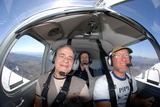 Thursday morning
Mike, Greg, and I set out over Lake Mead.
They introduced me to their local canyon flight, The Narrows,
and I introduced them to Pearce Ferry Airport (L25).
I figure these guys are proficient instrument pilots
(with a club name like
IMC)
while I'm two notches below
competent.
On the other hand,
I land on a lot more dirt, back-country runways
with non-standard and even canyon approaches.
Pearce Ferry seemed a good local stop.
They had some good advice on how to fly the turbulent air
in The Narrows to enjoy the view.
Thursday morning
Mike, Greg, and I set out over Lake Mead.
They introduced me to their local canyon flight, The Narrows,
and I introduced them to Pearce Ferry Airport (L25).
I figure these guys are proficient instrument pilots
(with a club name like
IMC)
while I'm two notches below
competent.
On the other hand,
I land on a lot more dirt, back-country runways
with non-standard and even canyon approaches.
Pearce Ferry seemed a good local stop.
They had some good advice on how to fly the turbulent air
in The Narrows to enjoy the view.
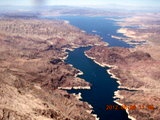 I did a nice landing at Pearce Ferry with my two passengers,
so they didn't go away wondering about me in the back country.
There's a saying in aviation,
"Maintain thy airspeed lest the ground come up and smite thee."
That's particularly true with airstrips on the edges of mesas
and I got it right.
I did a nice landing at Pearce Ferry with my two passengers,
so they didn't go away wondering about me in the back country.
There's a saying in aviation,
"Maintain thy airspeed lest the ground come up and smite thee."
That's particularly true with airstrips on the edges of mesas
and I got it right.
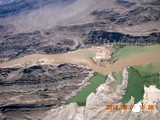 After our flight together,
Mike used his formation-flying experience
and Greg used his photographic skills
to get some terrific pictures of me and my airplane N8377W
over Lake Mead and Valley of Fire State Park.
He talked to me on the radio
so I could see the Lost City of Lake Mead
where people lived almost a century ago
and then I flew back home to Phoenix.
After our flight together,
Mike used his formation-flying experience
and Greg used his photographic skills
to get some terrific pictures of me and my airplane N8377W
over Lake Mead and Valley of Fire State Park.
He talked to me on the radio
so I could see the Lost City of Lake Mead
where people lived almost a century ago
and then I flew back home to Phoenix.
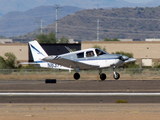
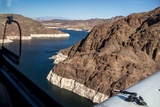
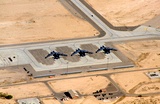
Summary
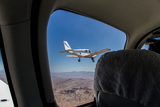 So it's an airplane vacation.
What's the big deal?
So it's an airplane vacation.
What's the big deal?
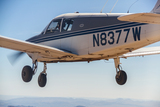 It was fun seeing my eclipse friends in Saint George.
(It was neat to tell them that I would be there in four hours
from Phoenix
after showering, dressing, driving, and flying.)
When I was in Las Vegas,
Mike and I know some people in common,
so we got to gossip a little.
(It's okay,
we were chatting about people we both liked,
so nothing bad was said about anybody.)
It was fun seeing my eclipse friends in Saint George.
(It was neat to tell them that I would be there in four hours
from Phoenix
after showering, dressing, driving, and flying.)
When I was in Las Vegas,
Mike and I know some people in common,
so we got to gossip a little.
(It's okay,
we were chatting about people we both liked,
so nothing bad was said about anybody.)
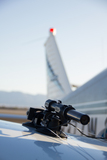 The combination of going places
and fun flying when I get there
makes airplanes wonderful and,
in my never-very-humble opinion,
makes my Piper Cherokee especially wonderful.
There are far-better back-country airplanes
that aren't very comfortable on long flights
and take considerably longer than my bird.
Most of those airplanes take a lot more pilot skill than I have
to land when the wind is gusty and from the wrong direction.
There are far-faster airplanes
that I don't think I would ever be comfortable
taking into the small, dirt airstrips
where I love landing and
running.
The Cherokee does nothing well,
but it does just about everything well enough
so I get the best of many worlds in aviation.
The combination of going places
and fun flying when I get there
makes airplanes wonderful and,
in my never-very-humble opinion,
makes my Piper Cherokee especially wonderful.
There are far-better back-country airplanes
that aren't very comfortable on long flights
and take considerably longer than my bird.
Most of those airplanes take a lot more pilot skill than I have
to land when the wind is gusty and from the wrong direction.
There are far-faster airplanes
that I don't think I would ever be comfortable
taking into the small, dirt airstrips
where I love landing and
running.
The Cherokee does nothing well,
but it does just about everything well enough
so I get the best of many worlds in aviation.
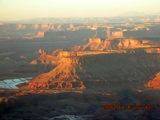
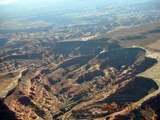
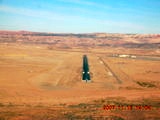
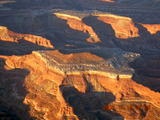
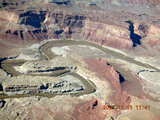
9:55:26 Mountain Standard Time
(MST).
2072 visits to this web page.